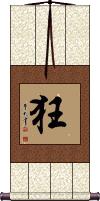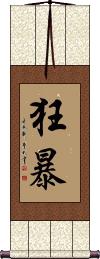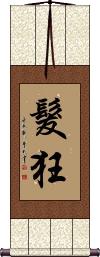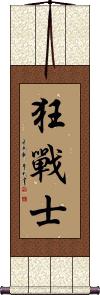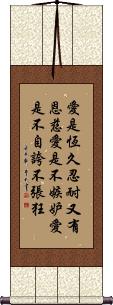Many custom options...
And formats...

狂 in Chinese / Japanese...
Buy an 狂 calligraphy wall scroll here!
Personalize your custom “狂” project by clicking the button next to your favorite “狂” title below...
3. Crazy / Mad
4. Berserker
Crazy / Mad / Wild
狂 is a single character that means “crazy” in Chinese, Japanese Kanji, and old Korean Hanja.
狂 means crazy, unrestrained, lunatic, insane, confused, deranged, wild, or mad.
This can also refer to an extreme enthusiast (like a football fan). But then, it can also refer to a person possessing a mental abnormality.
In some contexts, this can mean conceited (it probably won't be read that way on a wall scroll).
A warning: 狂 is an odd selection for a wall scroll. You should only order this if you plan to bewilder or confuse those who see it. It kind of says something about you, something that most native Asian people will not view in a good light.
Rage / Frenzy / Berserk
狂暴 is rage or the idea of going berserk in Chinese, Japanese Kanji, and old Korean Hanja.
Crazy / Mad
髮狂 is the nicest/coolest way to write “crazy” in Chinese.
There are several other ways to express “insane” or “mentally disturbed,” but they are either clinical terms or very serious afflictions.
髮狂 is not a great or normal selection for a wall scroll. Please only order this if you want this idea for some personal reason.
To put it another way: It's a little crazy to have a “crazy” wall scroll.
Berserker
Berserker
Alternate Chinese
Born To Be Wild
天生狂野 is “Born To Be Wild” (like the Steppenwolf song) in Chinese (Mandarin).
If you get to the deep meaning, the first two characters can mean “born” but refer as much to the nature, disposition, calling, or innate qualities of something or someone.
The last two mean coarse and/or wild.
So it kind of means that it is your nature to be wild.
Corinthians 13:4
All you need to know about LOVE
愛是恆久忍耐又有恩慈愛是不嫉妒愛是不自誇不張狂 is 1st Corinthians 13:4 in Chinese.

With large “love” character added.
In English, this reads:
1st Corinthians 13:4 (KJV) Charity suffereth long, and is kind; charity envieth not; charity vaunteth not itself, is not puffed up...
1st Corinthians 13:4 (NIV) Love is patient, love is kind. It does not envy, it does not boast, it is not proud.
1st Corinthians 13:4 (Basic English) Love is never tired of waiting; love is kind; love has no envy; love has no high opinion of itself, love has no pride.
The Chinese translation follows the love meaning, rather than the King James' use of “charity.” I was a little confused when writing this description with the significant differences between the NIV vs. KJV translations. After speaking to a Greek scholar about this, it would seem that the KJV has an almost errant translation with the use of “charity” in place of “love.”
We used the most popular Christian Chinese Bible, which is the Chinese Union Version (CUV). The CUV was first published in 1919. We use this so that the Chinese translation would be as accurate and standard as possible. Any Chinese Christian worth their salt will easily be able to identify this verse when they see these characters.
If you want a big “love” character written above the verse on your artwork, just make a note in the “special instructions” tab when you are customizing your artwork. There is no extra charge for that service on this special verse.
Not the results for 狂 that you were looking for?
Below are some entries from our dictionary that may match your 狂 search...
| Characters If shown, 2nd row is Simp. Chinese |
Pronunciation Romanization |
Simple Dictionary Definition |
狂 see styles |
kuáng kuang2 k`uang kuang kyou / kyo きょう |
More info & calligraphy: Crazy / Mad / Wild(suffix) (1) (some type of) enthusiast; (suffix) (2) someone possessed of a (certain kind of) mental abnormality Deranged, mad, wild. |
狂暴 see styles |
kuáng bào kuang2 bao4 k`uang pao kuang pao kyoubou / kyobo きょうぼう |
More info & calligraphy: Rage / Frenzy / Berserk(noun or adjectival noun) rage; frenzy |
狂戰士 狂战士 see styles |
kuáng zhàn shì kuang2 zhan4 shi4 k`uang chan shih kuang chan shih |
More info & calligraphy: Berserker |
狂暴者 see styles |
kuáng bào zhě kuang2 bao4 zhe3 k`uang pao che kuang pao che |
More info & calligraphy: Berserker |
不狂 see styles |
fukyou / fukyo ふきょう |
(given name) Fukyō |
佯狂 see styles |
yáng kuáng yang2 kuang2 yang k`uang yang kuang youkyou / yokyo ようきょう |
to feign madness feigned madness |
倡狂 see styles |
chāng kuáng chang1 kuang2 ch`ang k`uang chang kuang |
variant of 猖狂[chang1 kuang2] |
偏狂 see styles |
henkyou / henkyo へんきょう |
(noun or adjectival noun) monomania; monomaniac |
兇狂 凶狂 see styles |
xiōng kuáng xiong1 kuang2 hsiung k`uang hsiung kuang |
fierce; ferocious; savage |
午狂 see styles |
gokyou / gokyo ごきょう |
(given name) Gokyō |
只狂 see styles |
shikyou / shikyo しきょう |
(given name) Shikyō |
喧狂 see styles |
kenkyou / kenkyo けんきょう |
(adjectival noun) (rare) loud and crazy |
嗔狂 see styles |
chēn kuáng chen1 kuang2 ch`en k`uang chen kuang |
to be deranged |
大狂 see styles |
daikyou / daikyo だいきょう |
(given name) Daikyō |
張狂 张狂 see styles |
zhāng kuáng zhang1 kuang2 chang k`uang chang kuang |
brash; insolent; frantic |
抓狂 see styles |
zhuā kuáng zhua1 kuang2 chua k`uang chua kuang |
to blow one's top; to be driven mad; to become frantic |
熱狂 see styles |
nekkyou / nekkyo ねっきょう |
(n,vs,vi) wild enthusiasm; being crazy about |
物狂 see styles |
bukkyou / bukkyo ぶっきょう |
(adj-no,n) (1) (archaism) mad; insane; (adj-no,n) (2) (archaism) very surprised |
狂い see styles |
kurui くるい |
(1) madness; insanity; (2) irregularity; deviation; being out of order; (n-suf,n) (3) (usu. pronounced ぐるい as a suffix) fanaticism; fanatic; enthusiast; nut |
狂う see styles |
kuruu / kuru くるう |
(v5u,vi) (1) to go mad; to lose one's mind; to go crazy; to go insane; (v5u,vi) (2) to get out of order; to go amiss; to malfunction; to become imprecise; (v5u,vi) (3) to go wrong (of a plan or expectation, etc.); to fall through; to get mixed up; (v5u,vi) (4) to go crazy (over someone or something); to get enthusiastic; to go wild |
狂乱 see styles |
kyouran / kyoran きょうらん |
(n,vs,vi,adj-no) fury; frenzy; madness; wildness |
狂亂 狂乱 see styles |
kuáng luàn kuang2 luan4 k`uang luan kuang luan kyōran |
hysterical confusion |
狂二 see styles |
kyouji / kyoji きょうじ |
(given name) Kyōji |
狂人 see styles |
kuáng rén kuang2 ren2 k`uang jen kuang jen kyoujin / kyojin きょうじん |
madman (noun - becomes adjective with の) lunatic; madman; (given name) Kuruto |
狂介 see styles |
kyousuke / kyosuke きょうすけ |
(given name) Kyōsuke |
狂信 see styles |
kyoushin / kyoshin きょうしん |
(noun, transitive verb) fanaticism; zealotry; blind devotion |
狂傲 see styles |
kuáng ào kuang2 ao4 k`uang ao kuang ao |
domineering; haughty |
狂児 see styles |
kyouji / kyoji きょうじ |
(given name) Kyōji |
狂句 see styles |
kyouku / kyoku きょうく |
type of comic haiku |
狂吠 see styles |
kuáng fèi kuang2 fei4 k`uang fei kuang fei |
to bark furiously; to howl |
Click here for more 狂 results from our dictionary
The following table may be helpful for those studying Chinese or Japanese...
| Title | Characters | Romaji (Romanized Japanese) | Various forms of Romanized Chinese | |
| Crazy Mad Wild | 狂 狂 | kyou / kyo | kuáng / kuang2 / kuang | k`uang / kuang |
| Rage Frenzy Berserk | 狂暴 | kyou bou / kyoubou / kyo bo | kuáng bào kuang2 bao4 kuang bao kuangbao | k`uang pao kuangpao kuang pao |
| Crazy Mad | 髮狂 发狂 | fā kuáng / fa1 kuang2 / fa kuang / fakuang | fa k`uang / fakuang / fa kuang | |
| Berserker | 狂戰士 | kuáng zhàn shì kuang2 zhan4 shi4 kuang zhan shi kuangzhanshi | k`uang chan shih kuangchanshih kuang chan shih |
|
| Berserker | 狂暴者 | kuáng bào zhě kuang2 bao4 zhe3 kuang bao zhe kuangbaozhe | k`uang pao che kuangpaoche kuang pao che |
|
| Born To Be Wild | 天生狂野 | tiān shēng kuáng yě tian1 sheng1 kuang2 ye3 tian sheng kuang ye tianshengkuangye | t`ien sheng k`uang yeh tienshengkuangyeh tien sheng kuang yeh |
|
| Corinthians 13:4 | 愛是恆久忍耐又有恩慈愛是不嫉妒愛是不自誇不張狂 爱是恒久忍耐又有恩慈爱是不嫉妒爱是不自夸不张狂 | ài shì héng jiǔ rěn nài yòu yǒu én cí ài shì bú jì dù ài shì bú zì kuā bù zhāng kuáng ai4 shi4 heng2 jiu3 ren3 nai4 you4 you3 en2 ci2 ai4 shi4 bu2 ji4 du4 ai4 shi4 bu2 zi4 kua1 bu4 zhang1 kuang2 ai shi heng jiu ren nai you you en ci ai shi bu ji du ai shi bu zi kua bu zhang kuang | ai shih heng chiu jen nai yu yu en tz`u ai shih pu chi tu ai shih pu tzu k`ua pu chang k`uang ai shih heng chiu jen nai yu yu en tzu ai shih pu chi tu ai shih pu tzu kua pu chang kuang |
|
| In some entries above you will see that characters have different versions above and below a line. In these cases, the characters above the line are Traditional Chinese, while the ones below are Simplified Chinese. | ||||
Successful Chinese Character and Japanese Kanji calligraphy searches within the last few hours...
